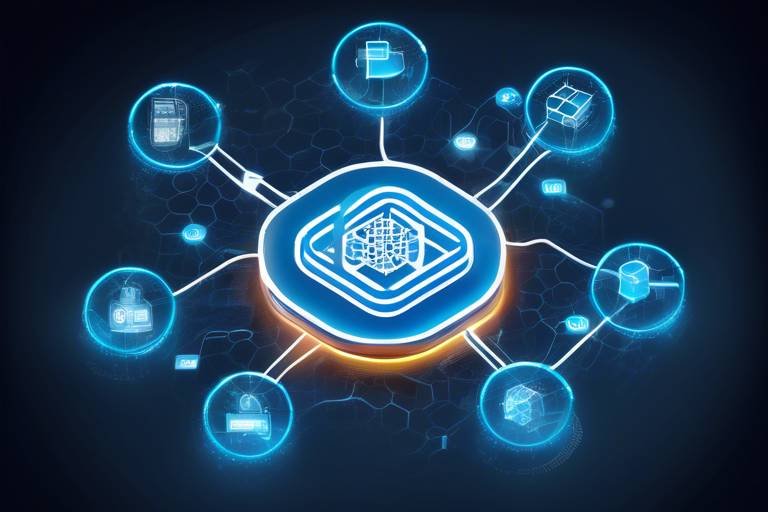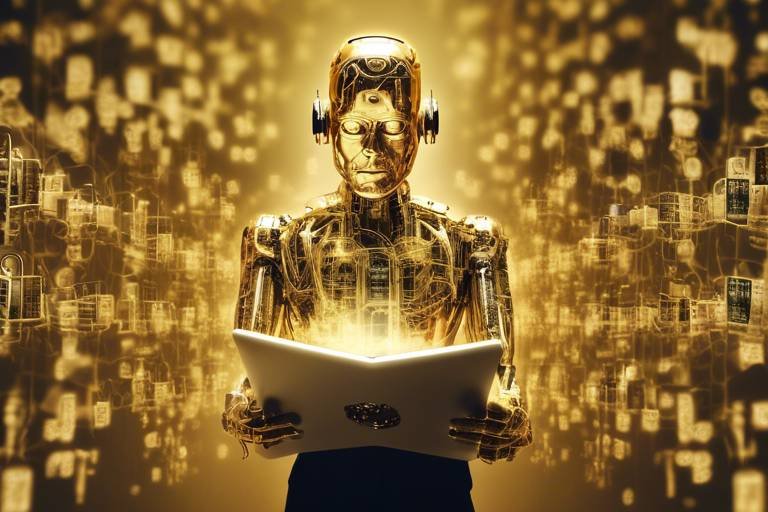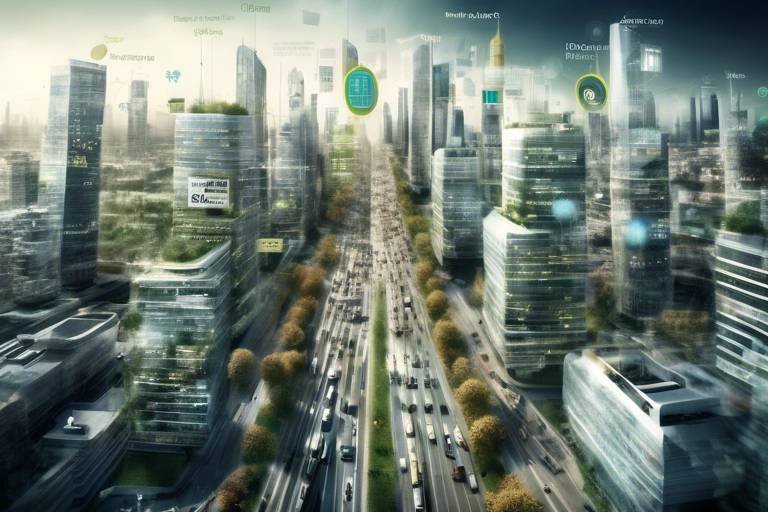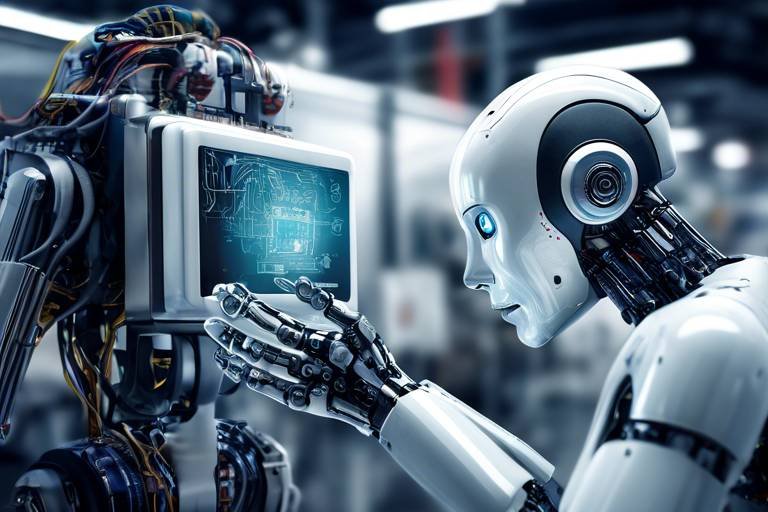Impact of AI on the Job Market: A Shift in Job Roles
In recent years, the rise of artificial intelligence (AI) has sparked a profound transformation across various sectors, fundamentally altering the landscape of employment. As we step into an era where machines can learn, adapt, and even make decisions, the question arises: how will this affect the job market? This article explores the multifaceted impact of AI on job roles, the skills required for the future, and what employment might look like in a world increasingly driven by technology.
Artificial intelligence is not just a buzzword; it’s a powerful tool that is reshaping industries and job functions. From automating mundane tasks to enhancing decision-making processes, AI is being integrated into the workplace in various innovative ways. Companies are leveraging AI to streamline operations, reduce costs, and improve customer experiences. For instance, AI-powered chatbots are revolutionizing customer service by providing instant responses, while machine learning algorithms are optimizing supply chain management. However, as AI becomes more prevalent, it raises important questions about the implications for employment dynamics. Will AI lead to job losses, or will it create new opportunities for workers?
One of the most significant debates surrounding AI is the balance between job displacement and job creation. While it’s true that AI can automate certain tasks, leading to the elimination of some roles, it also has the potential to create entirely new job opportunities. For example, as businesses adopt AI technologies, there is a growing demand for professionals who can develop, manage, and maintain these systems. This duality of AI's impact on employment highlights the need for a nuanced understanding of the evolving job market. The key is to identify which roles are at risk and which new roles are emerging in the tech-driven landscape.
AI excels in automating repetitive tasks, which can lead to increased efficiency and productivity. Jobs that involve routine, predictable tasks are particularly susceptible to automation. For instance, roles in data entry, assembly line work, and basic customer service are among the first to be affected. While this automation can free up human workers to focus on more complex and creative tasks, it also raises concerns about job security for those in vulnerable positions. The potential consequences for these workers could be significant, prompting a need for proactive measures to support affected individuals.
Certain sectors are more vulnerable to job displacement due to AI than others. Industries such as manufacturing, retail, and transportation are experiencing significant changes. For example:
- Manufacturing: Automated robots are taking over assembly line tasks.
- Retail: Self-checkout systems are reducing the need for cashiers.
- Transportation: The rise of autonomous vehicles threatens traditional driving jobs.
These changes underscore the urgency for workers in these fields to adapt and prepare for the future job market.
As automation rises, the need for reskilling and upskilling the workforce becomes crucial. Workers must be equipped with new skills to remain relevant in an evolving job market. Strategies for adaptation may include:
- Participating in training programs that focus on emerging technologies.
- Engaging in online courses to learn new skills.
- Networking with industry professionals to stay informed about trends.
By investing in their own development, workers can position themselves for success in an AI-driven world.
With the growth of AI, new job roles are emerging that require a unique blend of technical and soft skills. Positions such as AI trainers, data analysts, and machine learning engineers are becoming increasingly important. These roles not only demand proficiency in technology but also require critical thinking and creativity. As AI continues to evolve, the workforce must adapt to meet the demands of these innovative positions, ensuring they possess the necessary skills to thrive.
While technical skills are vital, soft skills are becoming increasingly important in the AI era. Interpersonal skills such as communication, teamwork, and emotional intelligence enhance collaboration and creativity in a tech-driven workplace. As AI takes over more technical tasks, the human element becomes even more crucial. Employers are seeking individuals who can work effectively alongside AI systems, leveraging their unique human capabilities to drive innovation and problem-solving.
The future of work involves a synergistic relationship between humans and AI systems. This collaboration can enhance productivity and innovation across various industries. For example, in healthcare, AI can assist doctors in diagnosing diseases more accurately, while healthcare professionals provide the empathy and understanding that machines cannot replicate. The partnership between humans and AI can lead to more effective outcomes, showcasing the importance of harnessing both human and artificial intelligence.
As AI reshapes the job market, ethical concerns arise regarding employment practices. Issues such as bias in hiring algorithms, job security, and the treatment of displaced workers must be addressed. It is essential for organizations to deploy AI responsibly, ensuring that technology enhances rather than undermines the workforce. By prioritizing ethical considerations, companies can create a more equitable and sustainable employment landscape.
1. Will AI take away all jobs?
While AI will automate certain tasks, it will also create new job opportunities. The key is to adapt and reskill for the changing job market.
2. What skills will be in demand in the future?
Technical skills related to AI and data analysis will be crucial, but soft skills like communication and teamwork will also be vital for collaboration with AI systems.
3. How can I prepare for an AI-driven job market?
Invest in education and training, stay informed about industry trends, and develop both technical and soft skills to enhance your employability.

Understanding AI's Role in Employment
Artificial intelligence (AI) is not just a buzzword; it’s a powerful force that is reshaping the landscape of employment in profound ways. Imagine walking into a workplace where machines not only assist but also perform tasks that were once the sole responsibility of humans. This is the reality we are stepping into, where AI technologies are integrated into various sectors, changing how we work and interact. From chatbots managing customer service inquiries to algorithms analyzing vast amounts of data, AI is enhancing efficiency and productivity across the board. But what does this mean for job roles? Are we looking at a future where jobs are lost, or are new opportunities waiting to be discovered?
To understand AI's role in employment, we need to look at how it is being utilized across different industries. In healthcare, for instance, AI systems are assisting doctors in diagnosing diseases with greater accuracy, while in finance, algorithms are streamlining processes like fraud detection and risk assessment. The implications of these advancements are significant. They not only enhance the quality of service but also shift the responsibilities of human workers. Rather than being replaced, many workers find themselves transitioning into roles that require a different set of skills. This evolution is crucial as it highlights the importance of adaptability in the workforce.
Moreover, the integration of AI into the workplace is not a one-size-fits-all scenario. Different industries experience varying degrees of AI impact. For example, manufacturing has seen a surge in robotics that take over repetitive tasks, while creative fields may leverage AI for data analysis or content generation. The key takeaway here is that AI is not merely a tool for automation; it is a catalyst for change that prompts us to rethink our approach to work. As we embrace this technology, we must also consider the skills that will be in demand. Skills such as data literacy, critical thinking, and emotional intelligence are becoming increasingly important in an AI-driven world.
In summary, AI's role in employment is multifaceted, encompassing both opportunities and challenges. It serves as a reminder that while technology evolves, so too must our approach to work and the skills we cultivate. As we navigate this new landscape, it’s essential to stay informed and proactive about the changes that AI brings. The future may seem uncertain, but with the right mindset and adaptability, we can harness the power of AI to create a more efficient and innovative workforce.

Job Displacement vs. Job Creation
The rise of artificial intelligence (AI) has sparked a heated debate about its impact on the job market. Are we witnessing a future where machines take over our jobs, or is AI creating new opportunities that we can't even imagine yet? This is a crucial question as we navigate through an era marked by rapid technological advancement. While it's true that AI automates many tasks, leading to job displacement in certain sectors, it simultaneously opens the door to new roles that require a different set of skills. In essence, the narrative isn't solely about loss; it's also about transformation and adaptation.
To understand this phenomenon better, let's break it down into two main components: job displacement and job creation. Job displacement refers to the elimination of certain roles due to automation and AI technologies. For instance, jobs that involve repetitive, manual tasks are particularly vulnerable. According to a recent study, approximately 40% of jobs in sectors like manufacturing and retail could be automated within the next decade. However, this doesn't mean that the workforce will simply shrink. Instead, we are likely to see a shift in the types of jobs available.
On the flip side, job creation emerges as a significant aspect of this discussion. As AI technologies evolve, they generate new roles that didn't exist before. For example, positions such as AI ethics compliance officers, data analysts, and machine learning engineers are becoming increasingly vital. According to the World Economic Forum, around 85 million jobs could be displaced by 2025, but at the same time, 97 million new roles may emerge that are more adapted to the new division of labor between humans, machines, and algorithms.
In this context, it’s essential to recognize that the job market is not a zero-sum game. Instead, it operates more like a dynamic ecosystem where jobs evolve, and new opportunities arise. For instance, as AI takes over mundane tasks, human workers can focus on more complex and creative aspects of their jobs, leading to increased job satisfaction and productivity. This shift can be likened to the transition from manual farming to technological agriculture, where farmers now use advanced tools and techniques to enhance their productivity.
However, this transition isn't without its challenges. Not everyone will seamlessly transition into new roles, and there is a real risk of widening the skills gap. Workers in vulnerable positions may find themselves without the necessary skills to adapt to the changing landscape. Therefore, companies, governments, and educational institutions must collaborate to ensure that workers are equipped with the skills needed for the future job market. This could involve investing in reskilling programs, vocational training, and lifelong learning initiatives.
In summary, while AI undoubtedly brings challenges in terms of job displacement, it also offers a wealth of opportunities for job creation. The key lies in our ability to adapt and embrace these changes. By focusing on reskilling and fostering an innovative mindset, we can ensure that the workforce is prepared for the exciting future that AI has in store.
- Will AI take away all jobs? No, while some jobs may be automated, many new roles will be created that require human skills.
- What types of jobs are most at risk of automation? Jobs involving repetitive tasks, such as assembly line work and data entry, are most susceptible to automation.
- How can workers prepare for the changes brought by AI? Workers can prepare by engaging in reskilling and upskilling programs to learn new technologies and soft skills.
- What new jobs are being created due to AI? Roles such as AI specialists, data analysts, and machine learning engineers are emerging as the demand for AI technology grows.

The Automation of Repetitive Tasks
In today's fast-paced world, artificial intelligence (AI) is quickly becoming the driving force behind the automation of repetitive tasks. This transformation is not just a technological trend; it represents a fundamental shift in how we approach work. Imagine a factory where machines can handle monotonous assembly line jobs, freeing human workers to engage in more creative and strategic roles. This is the reality that AI brings to various industries, enabling a level of efficiency that was previously unimaginable.
AI excels at taking over tasks that are routine and predictable. For instance, jobs that involve data entry, scheduling, or even basic customer service inquiries are prime candidates for automation. By employing AI systems, businesses can not only reduce human error but also speed up processes that would typically take hours, if not days, to complete. This leads to a significant increase in productivity, allowing companies to allocate their human resources to areas that require critical thinking and emotional intelligence, which machines simply cannot replicate.
However, this shift does not come without its challenges. Workers in roles that are highly susceptible to automation often face uncertainty about their future employment. For example, consider the following sectors that are particularly vulnerable:
- Manufacturing: Assembly line jobs are increasingly being replaced by robotic systems that can work tirelessly without breaks.
- Customer Service: Chatbots and automated response systems are taking over initial customer interactions, handling inquiries that previously required human agents.
- Data Processing: AI algorithms can analyze vast amounts of data far quicker than any human, making roles in data entry less relevant.
As we navigate this landscape, it’s crucial to understand that the automation of repetitive tasks is not inherently negative. While some jobs may disappear, new opportunities will arise, particularly in fields that require oversight of AI systems or involve creative problem-solving. In fact, a report from the World Economic Forum predicts that by 2025, machines will create 97 million new jobs, even as they displace 85 million roles. This balance between displacement and creation highlights the need for workers to adapt and evolve alongside technology.
Moreover, the automation of repetitive tasks can lead to improved job satisfaction for those who remain in the workforce. When employees are relieved of mundane tasks, they can focus on more engaging and fulfilling work, which can enhance their creativity and productivity. It’s like the difference between being stuck in traffic and cruising down an open highway; one is frustrating and tedious, while the other is liberating and exhilarating.
In conclusion, the automation of repetitive tasks is a double-edged sword. While it can lead to job displacement in certain sectors, it also opens the door to new roles and opportunities that require a human touch. As we embrace this change, it’s essential for both workers and employers to invest in training and reskilling initiatives, ensuring that the workforce is equipped to thrive in an AI-driven world. The future of work is not just about machines taking over; it’s about humans and AI working together to create a more efficient and innovative workplace.

Industries Most Affected by Automation
As we dive deeper into the age of artificial intelligence, it's essential to recognize the industries that are feeling the brunt of automation. While AI has the potential to revolutionize various sectors, it also poses significant challenges, particularly in industries heavily reliant on routine tasks. Let’s take a closer look at some of these sectors and understand why they are more vulnerable to job displacement.
One of the most impacted industries is manufacturing. In factories across the globe, robots and AI systems are taking over assembly lines, performing tasks that were once the domain of human workers. The precision and efficiency of machines often surpass that of humans, leading companies to favor automation to cut costs and boost productivity. For instance, tasks such as welding, painting, and assembly can now be completed by robotic arms that work tirelessly without breaks.
Another sector facing significant disruption is the retail industry. With the rise of e-commerce and automated checkout systems, traditional retail jobs are dwindling. Self-service kiosks and online shopping platforms are replacing cashiers and stock clerks, reshaping the landscape of retail employment. This shift not only affects job availability but also transforms the skills required for those who remain in the industry. Retail workers now need to be adept at managing technology rather than just interacting with customers.
Furthermore, the transportation and logistics industry is on the brink of a major transformation due to automation. Self-driving vehicles and drones are being tested and implemented, promising to streamline delivery processes and reduce human error. While this innovation could lead to faster and cheaper deliveries, it also threatens the jobs of truck drivers, delivery personnel, and warehouse workers. The implications of these changes are profound, as they not only affect employment numbers but also the skills that will be in demand moving forward.
In the financial services sector, AI is automating tasks such as data entry, fraud detection, and even investment analysis. Algorithms can process vast amounts of data much more quickly than a human ever could, leading to increased efficiency and reduced costs for financial institutions. However, this also means that roles traditionally held by analysts and clerks are increasingly at risk. Workers in this field must adapt by developing expertise in managing and interpreting AI outputs rather than performing routine calculations.
Lastly, the customer service industry is experiencing a significant shift due to the integration of chatbots and AI-driven customer support systems. These technologies can handle a wide range of inquiries, providing instant responses to customers while freeing human agents to tackle more complex issues. While this improves customer satisfaction, it also raises concerns about job security for customer service representatives, who may find their roles diminished as AI takes over basic interactions.
In summary, while automation presents exciting advancements, it also brings challenges that cannot be ignored. The industries most affected by this shift—manufacturing, retail, transportation, financial services, and customer service—are witnessing a transformation that will require workers to adapt swiftly. As we navigate this new landscape, it's crucial for both employees and employers to embrace change and foster a culture of reskilling and upskilling to thrive in an AI-driven world.
- What industries are most at risk due to automation? Industries like manufacturing, retail, transportation, financial services, and customer service are among the most affected.
- Will automation create new job opportunities? Yes, while some jobs may be displaced, automation also leads to the creation of new roles that require different skill sets.
- How can workers prepare for changes in the job market? Workers can focus on reskilling and upskilling to adapt to the evolving job landscape, emphasizing both technical and soft skills.

Reskilling and Upskilling Workforce
As we navigate through the rapidly changing landscape of the job market, the concepts of reskilling and upskilling have become more crucial than ever. With artificial intelligence (AI) automating many traditional job roles, workers must adapt to remain relevant and competitive. But what exactly do these terms mean? Reskilling refers to the process of learning new skills to transition into a different job role, while upskilling involves enhancing existing skills to improve performance in one’s current position. Both strategies are essential for workers aiming to thrive in an AI-driven world.
One of the most pressing challenges in the face of automation is the need for workers to embrace lifelong learning. The job market is evolving at an unprecedented pace, and those who resist change may find themselves left behind. To help facilitate this transition, companies and educational institutions are increasingly offering training programs specifically designed to equip employees with the necessary skills to succeed in new roles. These programs often focus on both technical skills, such as coding and data analysis, and soft skills, such as communication and teamwork.
Employers play a vital role in this process. By investing in their workforce through reskilling and upskilling initiatives, companies not only enhance employee satisfaction and retention but also boost overall productivity. According to a recent study, organizations that prioritize employee development are 21% more profitable than those that do not. This creates a win-win scenario: employees gain valuable skills, and employers benefit from a more capable and adaptable workforce.
Moreover, the emergence of online learning platforms has revolutionized how individuals can acquire new skills. Platforms like Coursera, Udacity, and LinkedIn Learning offer a plethora of courses that cater to various industries and skill levels. These resources make it easier than ever for workers to reskill or upskill at their own pace. Here’s a brief overview of some popular areas of focus:
| Skill Area | Course Examples | Potential Job Roles |
|---|---|---|
| Data Science | Data Analysis, Machine Learning | Data Analyst, Data Scientist |
| Digital Marketing | SEO, Social Media Marketing | Digital Marketing Specialist, Content Strategist |
| Software Development | Web Development, Mobile App Development | Software Engineer, Web Developer |
| Project Management | Agile Methodologies, Scrum Certification | Project Manager, Product Owner |
In addition to formal training programs, networking and mentorship can also play a pivotal role in the reskilling process. Connecting with industry professionals can provide valuable insights and guidance, helping individuals identify the skills they need to develop and the best ways to do so. Furthermore, participating in industry conferences or workshops can enhance one’s knowledge and expand professional networks, opening doors to new opportunities.
Ultimately, the responsibility for reskilling and upskilling lies not only with the employees but also with employers, educators, and policymakers. Together, they must create an ecosystem that supports continuous learning and development. By fostering a culture of adaptability and growth, we can ensure that the workforce is equipped to meet the challenges posed by AI and other emerging technologies. In this way, rather than viewing AI as a threat, we can embrace it as a catalyst for innovation and opportunity.
- What is the difference between reskilling and upskilling? Reskilling involves learning new skills for a different job role, while upskilling enhances existing skills for improved performance in the current role.
- How can I find reskilling opportunities? Look for training programs offered by your employer, online courses on platforms like Coursera, and industry-specific workshops.
- Why is reskilling important in the age of AI? As AI automates many tasks, reskilling helps workers adapt to new job roles and stay competitive in the job market.
- What role do employers play in reskilling? Employers can invest in employee development through training programs, mentorship, and creating a culture of continuous learning.

Emerging Job Roles in AI
As artificial intelligence continues to evolve and integrate into various sectors, it's not just about the jobs that are being automated; it's also about the fascinating new roles that are emerging in this AI-driven landscape. Think of it like a digital renaissance, where the canvas is technology and the paintbrush is innovation. The rise of AI is paving the way for a plethora of job opportunities that require a unique blend of technical prowess and creative thinking. So, what are these exciting new roles, and what skills do they demand?
One of the most prominent roles that have surfaced is that of the AI Ethicist. As AI systems become more complex and integral to decision-making processes, the need for professionals who can navigate the ethical implications of AI technology is paramount. These individuals are tasked with ensuring that AI applications are developed and deployed responsibly, considering factors such as bias, fairness, and accountability. They serve as the moral compass in a world where algorithms can significantly influence lives.
Another rapidly growing role is that of the Data Scientist. While this position has been around for a while, the advent of AI has transformed its scope. Data scientists now leverage AI tools to analyze vast amounts of data, uncover patterns, and derive actionable insights. They are the detectives of the data world, using their analytical skills to solve complex problems and drive business strategies. The demand for data scientists is skyrocketing, and those who can master AI technologies will find themselves in high demand.
Additionally, we have the AI Trainer. These professionals are responsible for teaching AI systems how to learn and adapt. They curate datasets, supervise the training processes, and fine-tune algorithms to ensure optimal performance. It's akin to being a coach for a sports team, where the goal is to help the AI "players" perform at their best. This role requires a blend of technical knowledge and creativity, as trainers must think critically about how to present data in ways that machines can understand.
Moreover, the role of AI Product Manager is emerging as a crucial position within tech companies. These individuals act as the bridge between engineering teams and business stakeholders, ensuring that AI products meet market needs while aligning with the company's strategic goals. They must possess a strong understanding of both technology and business, making it a dynamic and exciting career path.
As we look to the future, it's clear that the job market will continue to evolve, with AI playing a central role. To thrive in this new environment, aspiring professionals should focus on developing a diverse skill set that includes:
- Technical skills in AI and machine learning
- Strong analytical and problem-solving abilities
- Creative thinking for innovative solutions
- Interpersonal skills for effective collaboration
In summary, the emergence of AI is not just about job displacement; it’s also about the creation of new, exciting opportunities that require a combination of technical and soft skills. The future is bright for those willing to adapt and embrace the changes brought on by this technological revolution.
Q: What are some common emerging job roles in AI?
A: Common roles include AI Ethicist, Data Scientist, AI Trainer, and AI Product Manager. Each of these positions requires a unique blend of skills and expertise.
Q: How can I prepare for a career in AI?
A: To prepare for a career in AI, focus on acquiring technical skills in programming and data analysis, as well as developing critical thinking and problem-solving abilities.
Q: Are soft skills important in AI-related jobs?
A: Absolutely! While technical skills are essential, soft skills such as communication, teamwork, and creativity are increasingly important in collaborative AI environments.

The Importance of Soft Skills
In today's rapidly evolving job market, where artificial intelligence (AI) is becoming a dominant force, soft skills are emerging as a crucial component for success. While technical skills can get your foot in the door, it's often the ability to communicate, collaborate, and adapt that truly sets individuals apart in an AI-driven workplace. Think of soft skills as the oil that keeps the machinery of teamwork running smoothly. Without them, even the most advanced AI systems can struggle to achieve their full potential.
As we transition into this new era, employers are increasingly prioritizing candidates who possess a blend of technical expertise and strong interpersonal abilities. Why? Because AI can handle data processing and repetitive tasks, but it lacks the human touch—something that is essential for creativity, problem-solving, and emotional intelligence. In fact, a recent study found that 75% of employers value soft skills as much as or more than technical skills. This statistic highlights just how vital these skills have become in the modern workplace.
So, what exactly are these soft skills that everyone is talking about? They encompass a range of abilities, including:
- Communication: The ability to convey ideas clearly and effectively.
- Teamwork: Collaborating with others to achieve common goals.
- Adaptability: Adjusting to new challenges and environments with ease.
- Problem-solving: Identifying issues and developing creative solutions.
- Emotional Intelligence: Understanding and managing your emotions and those of others.
These skills not only enhance individual performance but also foster a culture of innovation and collaboration within organizations. For instance, when team members are adept at communicating their ideas, it can lead to more effective brainstorming sessions, resulting in groundbreaking projects that leverage both human creativity and AI efficiency.
Moreover, as AI takes over more routine tasks, the demand for roles that require strong interpersonal skills will only grow. Positions in management, customer service, and creative industries will increasingly require a human touch to complement AI capabilities. This shift means that workers must focus on developing their soft skills to remain competitive in the job market.
In conclusion, while technical skills will always hold their place in the workforce, the importance of soft skills cannot be overstated. They are the bridge between human potential and technological advancement. As we embrace the future of work, let’s not forget that it’s our ability to connect, empathize, and innovate that will ultimately drive success in an AI-driven world.
Q: What are soft skills?
A: Soft skills refer to interpersonal abilities that enable effective communication, teamwork, and problem-solving. They include skills like adaptability, emotional intelligence, and creativity.
Q: Why are soft skills important in an AI-driven workplace?
A: As AI takes over routine tasks, soft skills become essential for roles that require human interaction, creativity, and emotional intelligence, making them crucial for career advancement.
Q: How can I improve my soft skills?
A: You can improve your soft skills through practice, seeking feedback, engaging in team activities, and participating in workshops or training programs focused on communication and collaboration.

Collaboration Between Humans and AI
In today's rapidly evolving workplace, the partnership between humans and artificial intelligence (AI) is becoming increasingly vital. Imagine a world where machines and humans work hand-in-hand, complementing each other's strengths to achieve remarkable outcomes. This collaboration is not just a futuristic concept; it's happening right now across various industries. The synergy between human creativity and AI's analytical capabilities can lead to groundbreaking innovations and enhanced productivity.
One of the most exciting aspects of this collaboration is the ability of AI to handle massive amounts of data and perform complex calculations at lightning speed. For instance, in fields like healthcare, AI can analyze patient data, identify patterns, and suggest treatment options much faster than a human could. However, the human touch is irreplaceable when it comes to understanding patient emotions and providing compassionate care. This balance creates a dynamic where AI handles the heavy lifting, allowing humans to focus on what they do best: connecting with others and making informed decisions.
Moreover, as AI takes over repetitive tasks, employees can redirect their energy toward more creative and strategic endeavors. This shift not only boosts job satisfaction but also fosters an environment ripe for innovation. For example, in the marketing sector, AI can analyze consumer behavior and predict trends, enabling marketers to tailor their campaigns more effectively. As a result, marketing teams can spend more time brainstorming creative ideas rather than getting bogged down in data analysis.
However, this collaboration is not without its challenges. As we rely more on AI, there is a growing need for workers to develop new skills that enable them to work alongside these advanced technologies. This brings us to the importance of reskilling and upskilling. Organizations must invest in training programs that equip their employees with the necessary tools to thrive in an AI-enhanced environment. For example, understanding how to interpret AI-generated insights and applying them to real-world scenarios is becoming a crucial skill set.
Furthermore, ethical considerations play a significant role in the collaboration between humans and AI. Companies must ensure that their AI systems are designed and implemented responsibly, taking into account issues such as bias, transparency, and accountability. By fostering a culture of ethical AI use, organizations can build trust among their employees and customers, ensuring that the partnership between humans and machines is beneficial for all.
In conclusion, the collaboration between humans and AI is reshaping the future of work. By leveraging the strengths of both parties, we can create a more efficient, innovative, and ethical workplace. As we move forward, embracing this partnership will be crucial for success in an increasingly complex and technology-driven world.
- What are the benefits of collaboration between humans and AI?
Collaboration enhances productivity, fosters innovation, and allows humans to focus on creative tasks while AI handles repetitive ones. - How can workers prepare for a future with AI?
Workers can prepare by reskilling and upskilling to develop competencies that complement AI technologies. - What ethical considerations should companies keep in mind?
Companies should focus on ensuring transparency, accountability, and fairness in their AI systems to build trust and mitigate bias.

Ethical Considerations in AI Employment
As we navigate the rapidly evolving landscape of artificial intelligence (AI) in the workplace, it becomes increasingly important to address the ethical considerations that accompany these technological advancements. The integration of AI into various job roles raises questions about fairness, transparency, and the impact on human labor. Are we allowing machines to make decisions that could affect people's lives without sufficient oversight? This is a critical question that stakeholders must grapple with as AI continues to permeate our work environments.
One of the primary ethical concerns relates to job displacement. As AI systems take over tasks traditionally performed by humans, there is a growing fear of mass unemployment. This concern is not unfounded; studies have shown that certain sectors, such as manufacturing and customer service, are particularly susceptible to automation. However, the ethical dilemma lies in how we manage this transition. Should companies be held accountable for retraining displaced workers? What measures should be put in place to ensure that those affected can find new employment opportunities?
Moreover, the transparency of AI algorithms is another ethical consideration that cannot be ignored. Many AI systems operate as "black boxes," meaning that their decision-making processes are not easily understood by humans. This lack of transparency can lead to biases in hiring practices or performance evaluations, where certain groups may be unfairly disadvantaged. For instance, if an AI system is trained on historical data that reflects past biases, it may perpetuate these biases in its recommendations. Therefore, organizations must prioritize the development of explainable AI systems that provide insights into how decisions are made, ensuring fairness and accountability.
Furthermore, the collaboration between humans and AI introduces ethical challenges regarding responsibility. In scenarios where AI systems assist in decision-making, it becomes crucial to define who is responsible for the outcomes. If an AI system makes a poor recommendation that leads to negative consequences, should the blame fall on the developers, the users, or the AI itself? Establishing clear guidelines and accountability structures is essential to navigate these complexities.
To tackle these ethical dilemmas effectively, organizations can adopt several strategies:
- Implement regular audits of AI systems to ensure compliance with ethical standards.
- Engage in ongoing dialogue with stakeholders, including employees, to address concerns and gather feedback.
- Invest in training programs that not only focus on technical skills but also emphasize ethical considerations in AI deployment.
In conclusion, as we embrace the potential of AI to transform the workplace, we must remain vigilant about the ethical implications of its integration. By fostering a culture of responsibility, transparency, and inclusivity, we can harness the benefits of AI while minimizing its risks. The future of work should not only be about efficiency and productivity but also about creating a fair and just environment for all workers.
- What are the main ethical concerns regarding AI in employment?
The primary concerns include job displacement, algorithmic bias, transparency, and accountability in decision-making. - How can companies ensure ethical AI deployment?
Companies can implement regular audits, engage with stakeholders, and provide training on ethical considerations. - What is explainable AI?
Explainable AI refers to AI systems designed to provide insights into their decision-making processes, promoting transparency and fairness.
Frequently Asked Questions
- How is AI impacting the job market?
AI is transforming the job market by automating routine tasks, which can lead to job displacement in certain sectors. However, it also creates new opportunities, requiring workers to adapt to emerging roles that demand different skill sets.
- Will AI replace all jobs?
While AI will certainly automate some jobs, it won't replace all of them. Many roles will evolve, and new jobs will emerge that require human creativity, emotional intelligence, and complex problem-solving skills that AI cannot replicate.
- What types of jobs are most at risk of automation?
Jobs that involve repetitive tasks, such as data entry, assembly line work, and basic customer service, are most susceptible to automation. However, roles that require critical thinking, creativity, and interpersonal skills are less likely to be replaced.
- What skills should I focus on to remain relevant in an AI-driven job market?
To stay relevant, focus on developing both technical skills, such as data analysis and programming, and soft skills, like communication, teamwork, and adaptability. These combined skills will enhance your employability in an AI-enhanced workplace.
- How can workers reskill or upskill effectively?
Workers can reskill or upskill by taking online courses, attending workshops, or participating in industry-specific training programs. Networking with professionals in your desired field can also provide insights into the skills that are in demand.
- What new job roles are emerging due to AI?
New job roles such as AI trainers, data scientists, and ethical compliance managers are emerging. These positions require a blend of technical expertise and an understanding of ethical considerations surrounding AI deployment.
- Why are soft skills important in an AI-driven workplace?
Soft skills are crucial as they enhance collaboration, creativity, and problem-solving abilities among teams. In a workplace where AI handles routine tasks, human skills become the differentiating factor that drives innovation and success.
- How can humans and AI collaborate effectively?
Humans and AI can collaborate effectively by leveraging AI for data analysis and repetitive tasks while humans focus on strategic decision-making and creative problem-solving. This partnership can lead to increased productivity and innovative solutions.
- What ethical concerns arise with AI in the workplace?
Ethical concerns include job displacement, bias in AI algorithms, and privacy issues. It's essential for companies to implement responsible AI practices that ensure fairness and transparency in employment decisions.



















